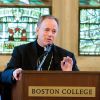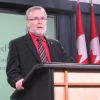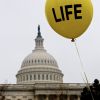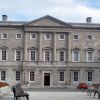Miller calms conflict within pro-life movement
This article was amended on Sept. 24, 2012 to clarify comments made by Jim Hughes.
OTTAWA - A statement by Vancouver Archbishop Michael Miller that supports Catholics who campaign for “gestational legislation” to limit abortion has helped calm growing tensions within the pro-life movement.
Miller wrote it is “morally licit” for Catholics to support legislation that sets limits on abortion rather than immediately banning it outright. The archbishop’s statement, quickly endorsed by Toronto’s Cardinal Thomas Collins and posted on the Canadian Conference of Catholic Bishops’ (CCCB) web site, urges co-operation in the pro-life movement but stresses: “Co-operation does not always mean unanimity regarding a given strategy; open and civil debate about the wisdom of any specific strategy is healthy.”
Over the past year, support in pro-life circles across Canada has grown for a law that would prohibit abortion at later stages of pregnancy or gestation. Campaign Life Coalition, the national political arm of the movement, however, has remained staunchly opposed as have several other groups that believe incremental legislation of this type will not result in an eventual ban on abortion.
Each side has accused the other of not being Christian or Catholic enough — either for not protecting those babies that might be saved through some restrictions on abortion, or for not sending a strong enough message about the value of all human life from conception.
But Miller said that both positions, for or against gestational legislation, are morally licit.
Miller wrote it is acceptable to support gestational legislation (i.e. legislation that would allow abortion in the early weeks of the unborn child’s development) as an incremental step that would reduce the harms of “an unjust legal regime that permits abortion.” But such law should be regarded “as a step along the way to the eventual full legal protection of the right to life of all unborn human beings.”
“At the same time, it is also morally licit to withhold support for gestational legislation — and other incrementalist legislative strategies intended to limit access to abortion — if, after prudent reflection, one is convinced that it is an unwise legislative strategy,” he said.
The Catholic Organization for Life and Family (COLF), co-sponsored by the CCCB and the Supreme Council of the Knights of Columbus, welcomed Miller’s intervention.
“The division within the pro-life movement is very preoccupying, especially when leaders and members of pro-life groups point at each other and criticize each other’s approach to protecting the unborn,” said COLF director Michele Boulva. “All this hinders our chances of obtaining a law that would protect the most vulnerable of Canadians — its unborn citizens.”
She applauded the bishops’ taking leadership in the pro-life arena.
“As Catholics it is essential that we turn to our bishops when confusion arises regarding the Church’s teaching. Christ has empowered them to teach in His name.”
Based on Blessed John Paul II’s teachings in Evangelium Vitae, “legislation which intends to limit the harm done by a pro-abortion law is not itself co-operation with unjust law but rather ‘a legitimate and proper attempt to limit its evil aspects,’ ” the archbishop wrote.
The absence of any law restricting abortion in Canada is a “de facto legal regime that permits abortion with almost no restrictions,” the archbishop said.
“Legislation intended to restrict access to abortion would not create a new legal situation in Canada which would authorize abortions, but instead would intend to limit the number of abortions already authorized under law,” he said.
He also reiterated Catholic teaching against abortion at any stage, noting that “no law can claim to legitimize abortion.”
Two major pro-life groups on either side of the issue welcomed Miller’s statement.
Campaign Life president Jim Hughes said the archbishop makes it clear we have a de facto law by having no restrictions on abortion.
“I thought Archbishop Miller laid the case pretty well,” he said. "Although I and many others would not necessarily agree with his opinion on a de facto law.”
The most important part of his statement “points out that gestational legislation may or may not be the way to go,” said Hughes, who remains wary of the gestational legislation approach.
Priests for Life Canada is among the many pro-life groups that would support gestational legislation. Priests for Life board chairman Fr. John Lemire, a parish priest based in New Liskeard, Ont., said he is pleased the archbishop’s statement has “supported the idea that a Catholic, a Catholic politician, can in good conscience support gestational legislation.”
The archbishop’s letter may have helped shore up some of the unity within the pro-life movement that has been fragile since its inception, Hughes said. The movement is made up of political, educational and pastoral groups that counsel and support mothers with unexpected pregnancies.
“Campaign Life Coalition has been accused of being ‘all or nothing’ and that’s not true,” Lemire said, noting that since its first questionnaire in 1978, it has “always had an incremental question as part of its strategy.”
The key, said Hughes, is in the wording of any legislation.
“I’m not in favour of ‘we need any law,’ ” Hughes said.
He is opposed to the gestational approach because the experience of countries with gestational laws in place have “so many exceptions” the laws are “virtually useless.” There are many other forms of incremental legislation that would restrict abortion — such as defunding it, or informed consent laws, that Campaign Life would support, he said.
“As the political branch of the pro-life movement we have been battling over 30 years,” he said. Campaign Life has also worked closely with counterparts in other countries who have said “gestational limits are not the way to go.”
Hughes’ objection to gestational legislation extends beyond doctrinal concerns to practical matters, he said. Campaign Life has focused on identifying and supporting individual pro-life candidates in both the Conservative and Liberal parties at the grassroots level. He noted that there are presently 60 pro-life MPs in Parliament. A gestational bill would not have the votes to pass, he said. In addition, Prime Minister Steven Harper remains unwilling to reopen the abortion debate.
Hughes said momentum on the issue has been shifting towards the pro-life movement, but a focus on gestational legislation risks sidetracking it.
The role of the Priests for Life, Lemire said, is to work with all the groups, to “try to be a bridge builder and bring about some dialogue and conversations” not only among groups but with bishops and people in dioceses.
That does not mean Priests for Life agrees with every tactic, he said. But he stressed people who might not be comfortable in an activist role could be great counselling a young expectant mother, or doing any number of tasks that need to be done to create a culture of life.
MP Woodworth makes final pitch on Motion 312
OTTAWA - Conservative MP Stephen Woodworth told journalists Sept. 17 his Motion 312 is not about abortion but whether Canada has lost its consensus on inalienable human rights and honest laws.
Woodworth admitted his private member’s motion has little chance of passing when it comes to a final vote Sept. 26 because the Prime Minister and chief government whip are on record that they will not support it because of promises they’ve made not to reopen the abortion debate.
On the opening day of the fall session of Parliament, Woodworth said Motion 312 “has much more important consequences than the abortion issue.” At stake is whether Canada has lost a consensus that the dignity and worth of every human being must be recognized, that rights are inalienable rather than granted by the government, that rights cannot be taken away through laws that deny basic human rights to a class of people by dehumanizing them and that laws must be honest, he said.
Motion 312 would strike a parliamentary committee to examine the 400-year-old definition of a human being in the Criminal Code’s homicide section concerning unborn children. For the purposes of the law, an unborn child is not a person with human rights until he or she leaves the birth canal. The committee would investigate whether this definition holds up in light of scientific evidence.
His motion specifically states the findings of the committee could not go against any Supreme Court of Canada decisions or the Constitution when it comes to women’s rights, he said.
Supreme Court Justice Bertha Wilson, who wrote the Morgentaler decision, was concerned about the rights of the unborn in later stages of pregnancy and left it open for Parliament to craft a law protecting them, and the courts have not closed the issue, he stressed.
Woodworth explained the motion, if passed, could undertake an investigation that may or may not settle the issue of when an unborn child is a human being.
“Even settling the issue of when a child should be a human being will not settle the issue of abortion,” he said.
Woodworth said one of the options of the committee could be to decide an unborn child is not a human being. His motion, however, is about universal human rights and he hoped the second hour of debate Sept. 21 would bring out that aspect.
Woodworth said he has been accused of “wanting to back to the Middle Ages,” or of opening issues that were settled by the courts. Opponents never talk about what his motion actually says, Woodworth said. No one has disagreed with the suggestion that unborn children might be human beings before birth.
“The first distraction is to talk about me, my character, my motives,” he said.
Tens of thousands of people have written their MPs in support of the motion, he said. And on Sept. 18, about 60 mainly religious and pro-life groups signed and sent a declaration in support of the motion to MPs. Among the 60 groups to sign “The Declaration of Support for Parliamentary Study of Canada’s Legal Definition of ‘Human Being’ ” were the Catholic Organization for Life and Family, the Knights of Columbus, REAL Women Canada, the Evangelical Fellowship of Canada and various evangelical churches.
After the news conference, journalists scrummed NDP Justice Critic Francoise Boivin who said the debate on abortion is closed. She pointed out Prime Minister Stephen Harper has taken the same view and Canadians have reached a consensus. The legal definition of a human being sees the pregnant woman as one person, not two, for the purposes of the law.
Surveys have consistently shown about two-thirds of Canadians would like some law restricting abortion.
JACKSON, Miss. - A federal judge allowed Mississippi's only abortion clinic to remain open while it continued to work toward compliance with a new state law permitting only certain doctors to perform abortions there.
District Court Judge Daniel P. Jordan III of Jackson partially lifted the injunction on a law that had been scheduled to take effect July 1 but continued to block sections of the law imposing civil or criminal penalties on violators.
The law requires that abortions be performed only by obstetricians-gynecologists with privileges to admit patients to local hospitals. Currently neither of the out-of-state doctors who perform abortions at the Jackson Women's Health Organization have such privileges.
WASHINGTON - The U.S. Supreme Court's June 28 decision upholding the health reform law makes it even more urgent for Congress to act to fix the law's "fundamental flaws" on abortion funding, conscience protection and immigrants' access to health care, the U.S. bishops said.
The court found that although the individual mandate in the 2010 health reform law does not pass constitutional muster under the Commerce Clause of the Constitution, it can be upheld as an acceptable exercise of Congress' taxing powers.
PHOENIX - Gov. Jan Brewer signed legislation May 4 that prevents the state of Arizona or any local government from using taxpayer dollars to contract with organizations that offer abortion as part of their services.
Brewer signed the measure at a reception held in Scottsdale by the Susan B. Anthony List, an organization that works to elect pro-life candidates to public office.
COLD LAKE, Alta. - A baby grows in her mother’s womb, and the parents love her and invest in her their dreams for the future. When she is born, this love blossoms. This was the situation for a Cold Lake couple, Patrice and Helene Roussel, in 1985. They were proud parents of a baby girl.
Three days after her birth, the child died.
Wither free speech
It’s difficult to judge which was the sadder sight in the House of Commons on April 26, Conservative MP Stephen Woodworth being ridiculed from all quarters for standing in defence of human life or the bleakness of him standing there alone.
The one certainty is that Woodworth has won our respect for rising as a lone voice in a hostile environment to promote values that are widely belittled in society, but also for rising, perhaps inadvertently, as a champion of the right to speak freely in Parliament.
OTTAWA - Conservative MP Stephen Woodworth’s motion proposing a committee study the legal definition of when life begins is not likely to gain much traction in the House of Commons.
The Kitchener, Ont., MP’s Motion 312 was debated in Parliament April 26, but gained no support from other MPs, including Prime Minister Stephen Harper who has said repeatedly that he will not support the motion, which most believe is aimed at getting Parliament to reopen the abortion debate.
Chief Government Whip Gordon O’Connor made the case for the status quo — which is no legal protection for the unborn from birth until the baby leaves the birth canal.
VATICAN CITY - The co-founder of Wikipedia told a Vatican audience that his online encyclopedia could contribute to peace by promoting "a more thoughtful world," even as the site was under fire for how it referred to those who oppose and support legalized abortion.
Jimmy Wales, who co-founded Wikipedia in 2001, was invited to address the annual assembly of the Pontifical Academy of Social Sciences. The meeting at the Vatican April 27-May 1 focused on Blessed John XXIII's 1963 encyclical "Pacem in Terris" and continuing challenges to promoting peace and justice in the world.
DUBLIN - Ireland's parliament rejected legislation that would have allowed a controversial 1992 Supreme Court ruling permitting abortion in limited circumstances to take effect.
The Socialist Party motion was defeated 111-20 April 19.
SAO PAULO - Supreme Court justices in Brazil voted to legalize the abortion of fetuses without brains or those with malformed brains, despite an effort that saw thousands of Brazilians praying outside of the court, urging the justices to protect the life of unborn children.
By late April 12, the majority of justices had announced their votes.
The Brazilian bishops' conference asked Catholics to hold prayer vigils outside of the court to encourage justices to consider the life of the unborn child prior to their vote.
Defund abortion petition gathers 23,000 signatures
About 23,000 Ontarians have signed a petition demanding Ontario stop funding medically unnecessary abortions, said Alissa Golob, youth co-ordinator for Campaign Life Coalition.
“And it’s still growing,” Golob said of the most recent numbers released March 26.
The petition is part of a two-year initiative to convince the provincial government to defund abortion in Ontario. Launched in October with the Defund Abortion Rally at Queen’s Park, the initiative includes pamphleting every riding in Ontario at least once with defund abortion literature, doing individual picketing outside MPP offices and lobbying.
Petitions were received from every riding in Ontario, said Golob.
“We’re currently in the process of giving them over to politicians. And then, as we get them in and gather another 20,000, we’ll do it again until we achieve success.”
The purpose of the petition is to send a message to Queen’s Park that this is an issue constituents are concerned about, she said.
“There is an army of people behind this campaign and it’s not just a small campaign led by some young people that isn’t worthy of their notice.”
An Abacus Data poll released last fall found 91 per cent of Canadians were not aware at least $30 million of public money is being spent annually to fund abortion procedures.
“I think it’s logical, whether you’re pro-life or not, that we shouldn’t be funding an elective procedure that’s medically unnecessary.”
Golob estimates the campaign will exceed about 50,000 signatures by the end.
“People don’t know about the funding of abortion in Ontario, which is why the education process is so important.”
Scottish court: Midwives can't object to managing staff for abortions
MANCHESTER, England - A Scottish court ruled that two senior Catholic midwives have no right to conscientiously object to overseeing staff involved in late-term abortions in a state-run hospital.
The Court of Session, Scotland's supreme civil court, ruled that Mary Doogan, 57, and Concepta Wood, 51, could not invoke the conscience clause of the 1967 Abortion Act to opt out of their duties at Glasgow's Southern General Hospital because they were not directly involved in performing the abortions.
Private member’s motion could re-open abortion debate
OTTAWA - A Conservative backbencher is using a private member’s motion that could re-ignite the abortion debate in Parliament.
MP Stephen Woodworth, who represents the Ontario Kitchener Centre riding, tabled a motion Feb. 6 that Parliament appoint a special committee of 12 members to review the section of the Criminal Code that states a child becomes a human being “only at the moment of complete birth.”
Though Woodworth told journalists he was not addressing abortion in his motion, Justice Minister Rob Nicholson issued a terse statement, saying “The Prime Minister has been very clear, our government will not reopen this debate.”
Abortion protest aims to keep issue in people’s minds
EDMONTON - Carrying placards against abortion, about 20 people marched in front of Edmonton’s Law Courts Building Jan. 27 to mark the 24th anniversary of the Supreme Court decision that threw out Canada’s abortion law.
“Twenty-four years ago, every (abortion) restriction in Canada was struck down by the Supreme Court,” lamented Edmonton Prolife spokesperson Karen Richert. “Abortion in Canada is wide open and is also paid for with your tax dollars.”
















